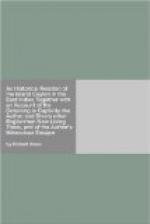[His Religion.] And now lastly for his Religion, you cannot expect much from him. Of the Religion of his Countrey he makes but a small Profession; as perceiving that there is a greater God, than those that they thro long custom, have and do Worship. And therefore when an Impostor, a Bastard Moor by Nation born in that Land; came and publickly set up a new nameless God, as he styled him; and that he was sent to destroy the Temples of their Gods, the King opposed it not for a good while, as waiting to see which of these Gods would prevail, until he saw that he aimed to make himself King, then he allowed of him no longer: as I shall shew more at large hereafter: when I come to speak of the Religion of the Countrey.
[How he stands affected to the Christian Religion.] The Christian Religion, he doth not in the least persecute, or dislike, but rather as it seems to me, esteems and honours it. As a sign of which take this passage. When his Sister died, for whom he had a very dear Affection, there was a very grievous Mourning and Lamentation made for her throughout the whole Nation; all Mirth and Feasting laid aside, and all possible signs of sorrow exprest: and in all probability, it was as much as their lives were worth, who should at this time do any thing, that might look like joy. This was about Christmas. The Dutch did notwithstanding adventure to keep their Christmas by Feasting. The News of this was brought to the King. And every body reckoned it would go hard with the Dutch for doing this. But because it was done at a Festival of their Religion, the King past it by, and took no notice of it. The Value also that he has for the Christian Religion, will appear from the respect he gives the Professors of it; as will be seen afterwards.
CHAP. III.
Of the Kings Tyrannical Reign.
Wee have all this while considered this King, with respect unto his Person, Temper, and Inclinations, now we will speak of him with more immediate respect unto his Office and Government, as he is a King. And here we will discourse of the manner of his Government, of his Treasure and Revenues, of his Great Officers, and lastly, of his Strength and Wars.
[His Government Tyrannical.] As to the manner of his Government, it is Tyrannical and Arbitrary in the highest degree: For he ruleth Absolute, and after his own Will and Pleasure: his own Head being his only Counsellor. The Land all at his Disposal, and all the People from the highest to the lowest Slaves, or very like Slaves: both in Body and Goods wholly at his Command. Neither wants He those three Virtues of a Tyrant, Jealousie, Dissimulation, and Cruelty.
[His Policy.] But because Policy is a necessary endowment of a Prince, I will first shew in an instance or two, that he is not devoid of it.




